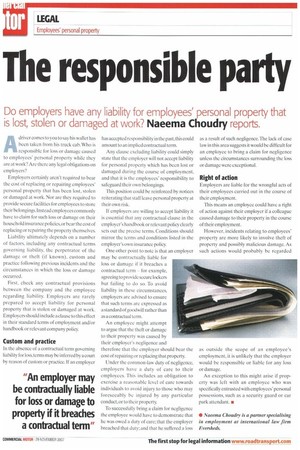The responsible party
Page 42

If you've noticed an error in this article please click here to report it so we can fix it.
Do employers have any liability for employees' personal property that
is lost, stolen or damaged at work? Naeema Choudry reports.
Adriver comes to you to say his wallet has been taken from his truck cab. Who is responsible for loss or damage caused to employees' personal property while they are at work? Are there any legal obligations on employers?
Employers certainly aren't required to bear the cost of replacing or repairing employees' personal property that has been lost, stolen or damaged at work. Nor are they required to provide secure facilities for employees to store their belongings. Instead employees commonly have to claim for such loss or damage on their household insurance policiesor bear the cost of replacing or repairing the property themselves Liability ultimately depends on a number of factors, including any contractual terms governing liability, the perpetrator of the damage or theft (if known). custom and practice following previous incidents and the circumstances in which the loss or damage occurred.
First, check any contractual provisions between the company and the employee regarding liability. Employers are rarely prepared to accept liability for personal property that is stolen or damaged at work. Employers should include a clause to this effect in their standard terms of employment and/or handbook or relevant company policy.
Custom and practice In the absence of a contractual term governing liability for loss, terms may be inferred by a court by reason of custom or practice. If an employer has accepted responsibility in the past, this could amount to an implied contractual term.
Any clause excluding liability could simply state that the employer will not accept liability for personal property which has been lost or damaged during the course of employment, and that it is the employees' responsibility to safeguard their own belongings.
This position could be reinforced by notices reiterating that staff leave personal property at their own risk.
If employers are willing to accept liability it is essential that any contractual clause in the employer's handbook or relevant policy clearly sets out the precise terms. Conditions should mirror the terms and conditions listed in the employer's own insurance policy.
One other point to note is that an employer may be contractually liable for loss or damage if it breaches a contractual term for example, agreeing to provide secure lockers but failing to do so. To avoid liability in these circumstances, employers are advised to ensure that such terms arc expressed as a standard of goodwill rather than as a contractual term.
An employee might attempt to argue that the theft or damage to their property was caused by their employer's negligence and therefore that the employer should bear the cost of repairing or replacing that property.
Under the common-law duty of negligence, employers have a duty of care to their employees. This includes an obligation to exercise a reasonable level of care towards individuals to avoid injury to those who may foreseeably be injured by any particular conduct, or to their property.
To successfully bring a claim for negligence the employee would have to demonstrate that he was owed a duty of care; that the employer breached that duty; and that he suffered a loss as a result of such negligence. The lack of case law in this area suggests it would be difficult for an employee to bring a claim for negligence unless the circumstances surrounding the loss or damage were exceptional.
Right of action Employers are liable for the wrongful acts of their employees carried out in the course of their employment.
This means an employee could have a right of action against their employer if a colleague caused damage to their property in the course of their employment.
However, incidents relating to employees' property are more likely to involve theft of property and possibly malicious damage. As such actions would probably be regarded as outside the scope of an employee's employment, it is unlikely that the employer would be responsible or liable for any loss or damage.
An exception to this might arise if property was left with an employee who was specifically entrusted with employees' personal possessions, such as a security guard or car park attendant. • • Naeema Choadry is a partner specialising In employment at international law firm Eversheds.






















































































































































































